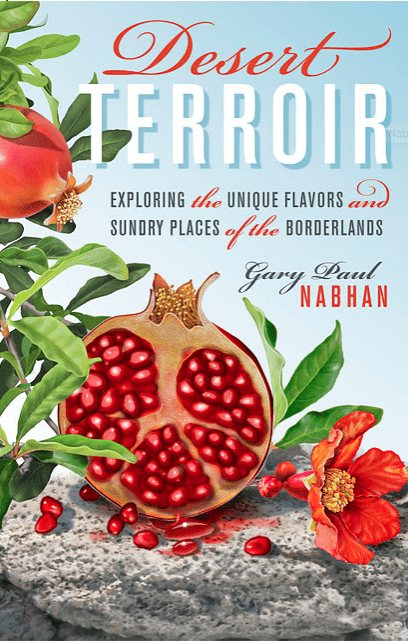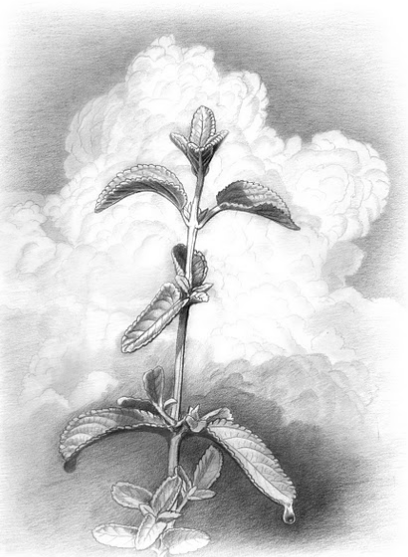Native Foods: Mesquite Flour and Desert Oregano
 Saturday October 19, 2013
Saturday October 19, 2013
10:00 am – 11:00 am
Cooking with Native Foods: Mesquite Flour and Desert Oregano
Native foods expert Abe Sanchez will educate us and cook a special treat using two native ingredients of southwestern North America: mesquite flour and desert oregano. Desert oregano is one of the richest sources of antioxidants in the plant world! We’ve featured mesquite flour before, but we’re also promoting this new item. 
At Tree of Life Nursery we purchase both items via fair trade from the Seri people in the Sonoran Desert who sustainably harvest and hand-process these crops from the wild. Come learn how to cook with these ancestral food items and purchase some to use in your kitchen at home.
For more information about Mesquite Flour – please see this article on our website.
(The images here are artwork by Paul Mirocha that were featured in the book: Desert Terroir: Exploring the Unique Flavors and Sundry Places of the Borderlands by Gary Nabhan, please see his blogpost about this and the other artwork featured in this beautiful book.)
Click on “Read More” to learn more about Desert Oregano…
Desert Oregano and the Seri people of the Sonoran Desert
Desert oregano (Lippia gravaolens) is a unique North American spice that is just one of two culinary herbs commonly in use today, indigenous to the United States (California bay leaf is the other). Thyme, basil, dill, sage, rosemary, tarragon, cilantro, parsley, marjoram, chervil, and common oregano are all from far away lands. Desert oregano is special because it is native to our homeland. This wild-collected variety gathered by the Seri people is rich in flavor because of the arid conditions where it is found. Like most dryland herb species, supplemental water in a garden situation would actually reduce the potency of flavor in the cultivated plant.
The Seri are a very special people group who today reside on the mainland Mexican coast off the the Gulf of California/Sea of Cortez. The Seri people have survived many cultural shifts throughout the last 300 years, and yet they have maintained their language and their day-to-day living traditions in the years since contact with Spanish and Mexican cultures. Their relative isolation in the arid and harsh land they live in has allowed many of their traditions to be left intact even in this modern age. Today, the Seri also share some of their long cultural traditions by selling their arts and craftwork; such as jewelry, carved ironwood figures and basketry; as well selling food items like fish they have hunted and the sustainably gathered oregano we are featuring at Tree of Life.
The cultural rules that govern the Seri people’s harvest of desert oregano protect the plant from damage in the wild. They selectively harvest from within clumps of growth, so as to not deplete the entire stand, they leave a fair amount of leaves on the plants by raking the stems of the plants gently. They also limit branch breakage and avoid trampling of the root area of the plants. The Seri (or Comcáac) traditionally used desert oregano as a culinary herb to season fish and venison, as a medicine to cure dizziness, and as a vermifuge to expel head lice. Today, desert oregano is purported to be one of the richest sources of antioxidants in the plant world.
The flavor of desert oregano is very distinctive from common oregano. It is related to lemon verbena, which helps explain some of its more citrus notes, but it also carries a bit of a bite. It’s strong and pleasant flavor can liven up meat dishes, sauces and can even be used as a substitute for basil leaves in pesto-like preparations. A flavorful spice that is sustainably collected while also providing rich antioxidants, incorporating this wild spice into your diet will be enjoyable on many levels. You can also feel good about supporting the Seri people by purchasing a culturally significant food item that was hand-processed and collected in a ancient and sustainable manner.
References used for this article:
Artwork © Paul Mirocha: http://paulmirocha.com/desert-terroir/#.Ukcta2Sidn8
Center for Sustainable Environments: http://www.environment.nau.edu/international/oregano.htm
Wikipedia: http://en.wikipedia.org/wiki/Seri_people
Encyclopedia Britannica: http://www.britannica.com/EBchecked/topic/535570/Seri
University of Arizona Press: http://www.uapress.arizona.edu/onlinebks/SERIS/HISTORY.HTM
Slow Food Foundation: http://www.slowfoodfoundation.com/ark/details/945/desert-oregano
Today is… Fava Beans/365 Whole Foods: http://365wholefoods.blogspot.com/2012/10/desert-oregano-lippia-graveolens.html